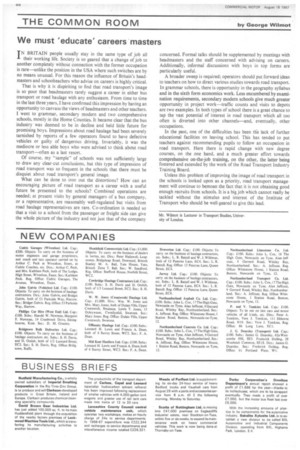We must 'educate' careers masters
Page 88

If you've noticed an error in this article please click here to report it so we can fix it.
TN BRITAIN people usually stay in the same type of job all their working life. Society is so geared that a change of job to another completely without connection with the former occupation is rare—unlike the position in the USA where such switches are by no means unusual. For this reason the influence of Britain's headmasters and schoolteachers who advise on careers is highly critical.
That is why it is dispiriting to find that road transport's image is so poor that headmasters rarely suggest a career in either bus transport or road haulage with any enthusiasm. From time to time in the last three years, I have confirmed this impression by having an opportunity to canvass the views of headmasters and other teachers. I went to grammar, secondary modern and two comprehensive schools, mostly in the Home Counties. It became clear that the bus industry was deemed to be in decline and held little future for promising boys. Impressions about road haulage had been severely tarnished by reports of a few operators found to have defective vehicles or guilty of dangerous driving. Invariably, it was the mediocre or less able boys who were advised to think about road transport—often as a last resort.
Of course, my "sample" of schools was not sufficiently large to draw any clear-cut conclusions, but this type of impression of road transport was so frequent in the schools that there must be disquiet about road transport's general image.
What can be done to iron out the distortions? How can an encouraging picture of road transport as a career with a useful future be presented to the schools? Combined operations are needed; at present visits by general managers of a bus company, or a representative, are reasonably well-regulated but visits from road haulage representatives are rare. Co-ordination is needed so that a visit to a school from the passenger or freight side can give the whole picture of the industry and not just that of the company concerned. Formal talks should be supplemented by meetings with headmasters and the staff concerned with advising on careers. Additionally, informal discussions with boys in top forms are particularly useful.
A broader sweep is required; operators should put forward ideas to teachers on how to direct various studies towards road transport. In grammar schools, there is opportunity in the geography syllabus and in the sixth form economics work. Less encumbered by examination requirements, secondary modern schools give much greater opportunity in project work—traffic counts and visits to depots are two examples. In both types of school there is a great chance to tap the vast potential of interest in road transport which all too often is diverted into other channels—and, eventually, other occupations.
In the past, one of the difficulties has been tile lack of further educational facilities on leaving school. This has tended to put teachers against recommending pupils to follow an occupation in road transport. Here there is rapid change with new degree courses, on the one hand, and a much greater effort towards comprehensive on-the-job training, on the other, the latter being fostered and extended by the work of the Road Transport Industry Training Board.
Unless this problem of improving the image of road transport in the schools is looked upon as a priority, road transport management will continue to bemoan the fact that it is not obtaining good enough recruits from schools. It is a big job which cannot really be tackled without the stimulus and interest of the Institute of Transport who should be well-geared to give this lead.




































































































































